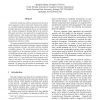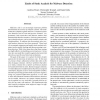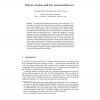15 search results - page 2 / 3 » Impeding Malware Analysis Using Conditional Code Obfuscation |
MICRO
2009
IEEE
13 years 11 months ago
2009
IEEE
Recent micro-architectural research has proposed various schemes to enhance processors with additional tags to track various properties of a program. Such a technique, which is us...
ACSAC
2007
IEEE
13 years 11 months ago
2007
IEEE
Detection of malicious software (malware) by the use of static signatures is often criticized for being overly simplistic. Available methods of obfuscating code (so-called metamor...
ACSAC
2007
IEEE
13 years 11 months ago
2007
IEEE
Malicious code is an increasingly important problem that threatens the security of computer systems. The traditional line of defense against malware is composed of malware detecto...
SP
2010
IEEE
13 years 8 months ago
2010
IEEE
—To handle the growing flood of malware, security vendors and analysts rely on tools that automatically identify and analyze malicious code. Current systems for automated malwar...
CAV
2011
Springer
12 years 8 months ago
2011
Springer
Abstract. The underground malware-based economy is flourishing and it is evident that the classical ad-hoc signature detection methods are becoming insufficient. Malware authors ...



